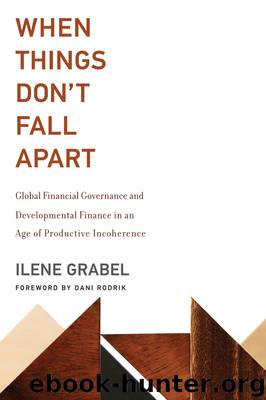When Things Don't Fall Apart: Global Financial Governance and Developmental Finance in an Age of Productive Incoherence by Ilene Grabel

Author:Ilene Grabel
Language: eng
Format: epub
Tags: Finance, Economic Development, Business & Economics, Economics, Political Science, General, international, International Relations, development, emerging economies; global economy; international economics; international relations; political science; financial governance; policy; multipolarity; reform; development economics; IMF; International Monetary Fund; neoliberal; neoliberalism
Publisher: MIT Press
Published: 2017-01-15T01:04:51.108000+00:00
The Eurasian Fund for Stabilization and Development
The member countries of the Eurasian Economic Community created the Eurasian Fund for Stabilization and Development (EFSD) in June 2009.37 Until 2015, it was known as the Eurasian Economic Community Anti-Crisis Fund. Since its founding, the Fund has operated as a hybrid that involves features of reserve pooling and development banking. The EFSD serves as a regional safety net that extends what it terms financial credits to governments to offset the effects of the global crisis; funds stabilization programs by supporting budgets, balance of payments, and currencies; and ensures the long-run economic stability of member nations. The EFSD also provides what it terms investment loans to governments and firms for large interstate projects that support regional integration or national investment and has a new program of grants aimed at supporting social programs.
The EFSD was established with subscribed contributions of US$8.5 billion by six countries.38 It has paid-in contributions of US$2.8 billion, most of which comes from Russia, its largest member.39 Paid-in contributions to the EFSD come from pooled member resources via budget contributions. At present, it has no capacity to issue bonds or to otherwise tap financial markets (Rhee, Sumulong, and Vallée 2013). Votes at the EFSD are weighted by capital contributions (as per the ArMF, the BWIs, and the MRDBs). Russia holds 85% of the votes and consequently holds veto power.
The Eurasian Development Bank manages EFSD resources and conducts surveillance of EFSD borrowers (Rhee, Sumulong, and Vallée 2013, 224).40 There are no automatic disbursals of financial credits from the EFSD, and all disbursements are tied to a heavily and regularly monitored adjustment (i.e., conditionality) program. Financial credits are followed by consultations intended to determine the likelihood of borrower success in implementing reforms or stabilization programs that are funded by the EFSD. Recipients are not required to work with the IMF, though the EFSD claims that it is “guided” by the IMF in matters relating to financial credits. It also uses IMF benchmarks when assessing various matters, such as corporate governance. Indeed, an EFSD annual report notes that the manager “consulted with the IMF on a regular basis regarding economic policy guidelines for Armenia, Belarus, Kyrgyz Republic, and Tajikistan” and that EFSD officials have been discussing coordination initiatives with the AsDB, World Bank, and IMF since 2014 (EFSD website, annual report 2014,12). The EFSD does not extend financial credits to countries that are in arrears to the IMF, other multilateral institutions, or EFSD members. However, in the case of Belarus, the EFSD extended a financial credit to the country when the IMF declined to do so. Decisions on financial credits by the EFSD are rapid—available evidence suggests that internal decisions on loan disbursements are made in two to eight weeks (Mühlich and Fritz 2016, 15).
To date, the EFSD has extended only four financial credits, totaling almost US$3 billion (to Tajikistan in 2010 and 2016, Belarus in 2011, and Armenia in 2015). Its largest extension of financial credits to date was to Belarus—its support package of US$2.
Download
This site does not store any files on its server. We only index and link to content provided by other sites. Please contact the content providers to delete copyright contents if any and email us, we'll remove relevant links or contents immediately.
| Elections & Political Process | Ideologies & Doctrines |
| International & World Politics | Political Science |
| Public Affairs & Policy | Specific Topics |
| United States |
The Secret History by Donna Tartt(19053)
The Social Justice Warrior Handbook by Lisa De Pasquale(12187)
Thirteen Reasons Why by Jay Asher(8893)
This Is How You Lose Her by Junot Diaz(6877)
Weapons of Math Destruction by Cathy O'Neil(6265)
Zero to One by Peter Thiel(5787)
Beartown by Fredrik Backman(5737)
The Myth of the Strong Leader by Archie Brown(5500)
The Fire Next Time by James Baldwin(5431)
How Democracies Die by Steven Levitsky & Daniel Ziblatt(5215)
Promise Me, Dad by Joe Biden(5141)
Stone's Rules by Roger Stone(5081)
A Higher Loyalty: Truth, Lies, and Leadership by James Comey(4954)
100 Deadly Skills by Clint Emerson(4921)
Rise and Kill First by Ronen Bergman(4780)
Secrecy World by Jake Bernstein(4741)
The David Icke Guide to the Global Conspiracy (and how to end it) by David Icke(4709)
The Farm by Tom Rob Smith(4502)
The Doomsday Machine by Daniel Ellsberg(4484)
